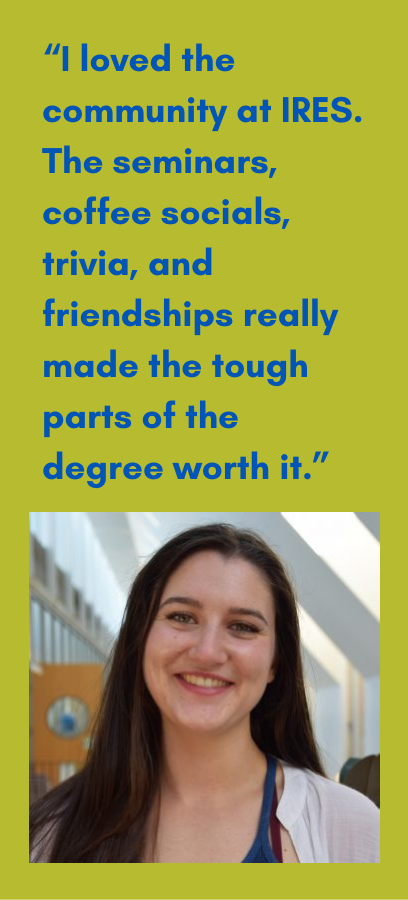Emma Gillies graduated from the RES program with an MSc in 2022, under the supervision of Dr. Amanda Giang.
While at IRES, her research involved modelling mercury bioaccumulation in Beaufort Sea beluga whales using Indigenous Knowledge and Western Science. She maintains interests in climate change, ecotoxicology, environmental policy, and the connections between environmental and public health. She is now a biologist for Fisheries and Oceans Canada.
We asked Emma a few questions to learn about what she gained at IRES and how those skills help her in her current position. Check out her answers below!

Question: Please describe why you chose to pursue your graduate studies at IRES.
Answer: I decided to pursue my Master’s degree at IRES because I really wanted to pursue a research project, but I also really wanted to do coursework, and I felt that IRES had a good mix of both. The research that I had the opportunity to do under Dr. Amanda Giang felt like a perfect fit, and I liked that the program was interdisciplinary. Coming from an environmental science background, I wanted to further my education in the natural sciences while also exposing myself to other areas, especially policy. Another very important factor for me was that the program was well-funded.
Question: What values, practices, or activities did you enjoy at IRES?
Answer: I loved the community at IRES. The seminars, coffee socials, trivia, and friendships really made the tough parts of the degree worth it. I also loved all of the opportunities to learn. Since the program is so interdisciplinary, I felt that I was constantly learning from fellow IRES students, lab mates, and students from other programs, as well as from professors, lectures in the unit’s seminar series, and internship opportunities. IRES offered the unique opportunity to really dive into my specific area of study while also making the most of other opportunities—for instance, I was able to be a TA for a marine pollution course, take an investigative journalism class, present my research at multiple conferences, and attend networking events.

Question: In what ways did your experience in IRES help prepare you for what you do now?
Answer: I’m currently working as a biologist for Fisheries and Oceans Canada (a department of the Canadian federal government), where I often interact with both policy and science, as well as with colleagues from many different disciplines. My training in IRES not only strengthened my technical skills (for example in data analysis, qualitative methods, and marine ecology) but also less tangible—and often overlooked—skills, such as the ability to think critically, ask questions, and work in a team. IRES also really fostered my love of learning, something that I still continue outside of my job today through attending seminars and volunteering with Vancouver organizations.
We’re proud of our all our alumni! Learn about more of them here.